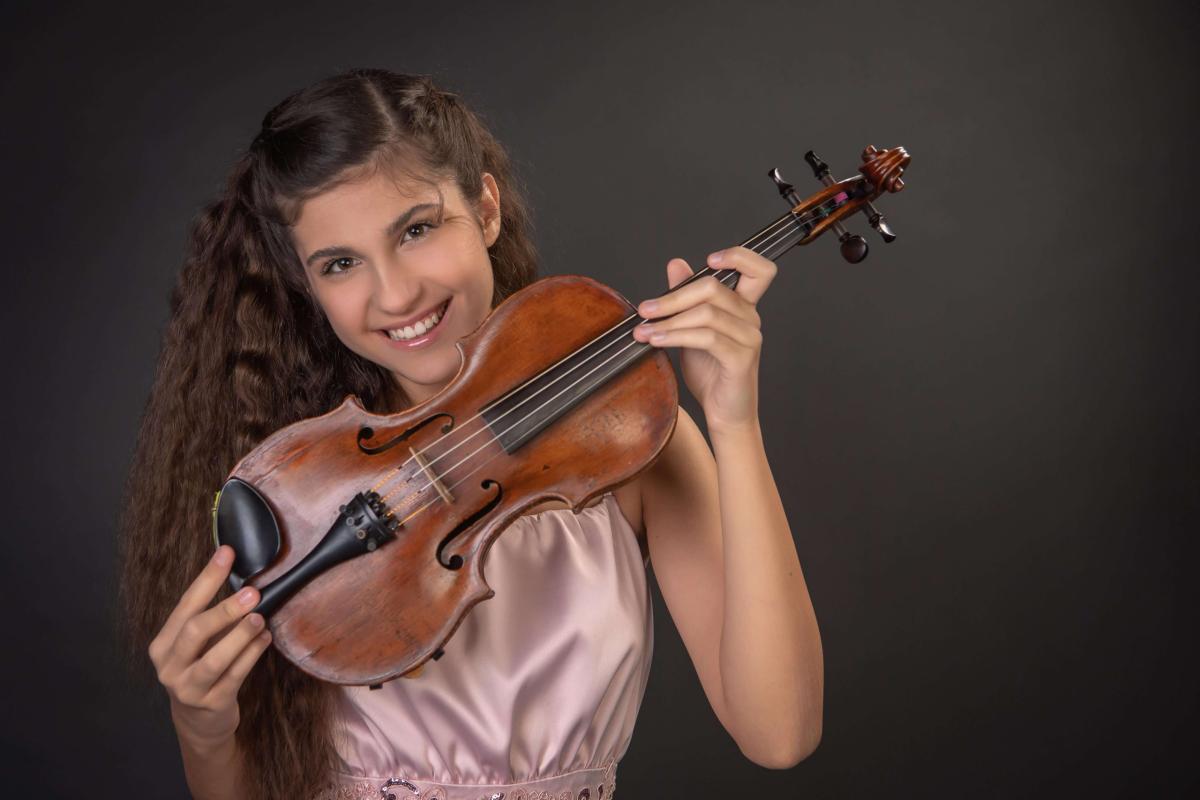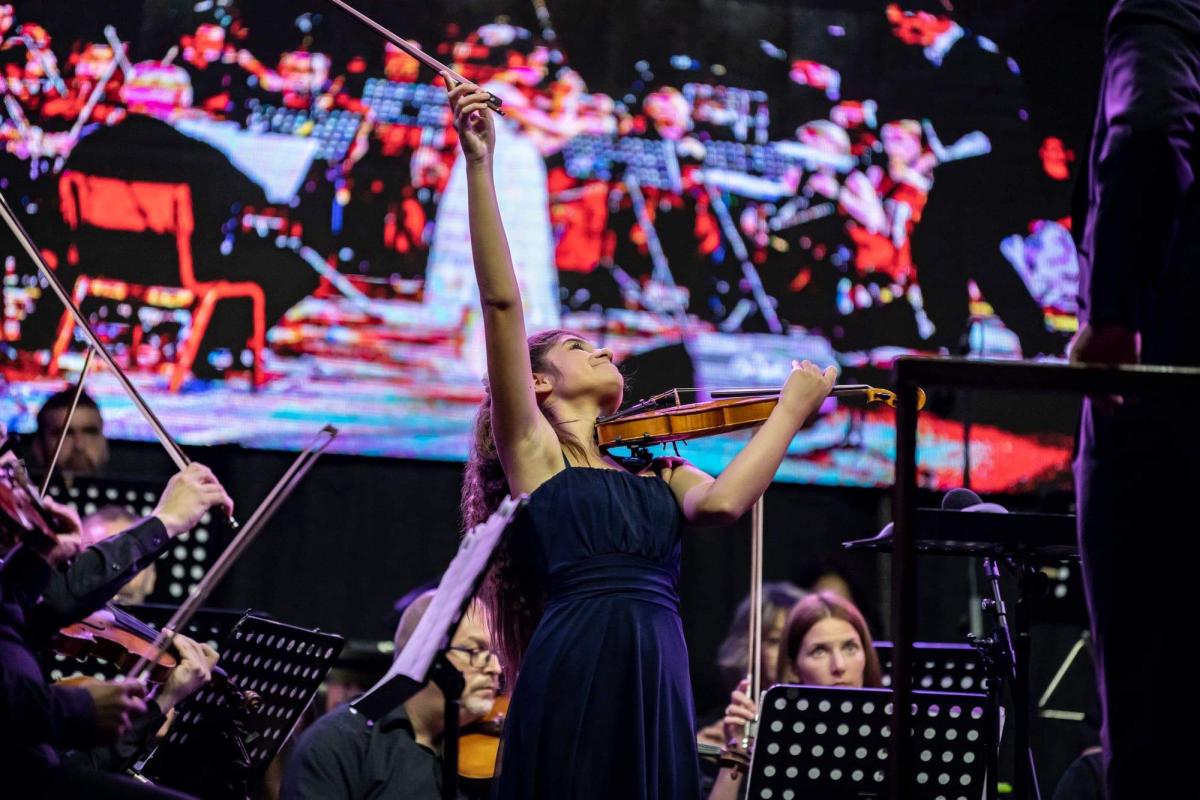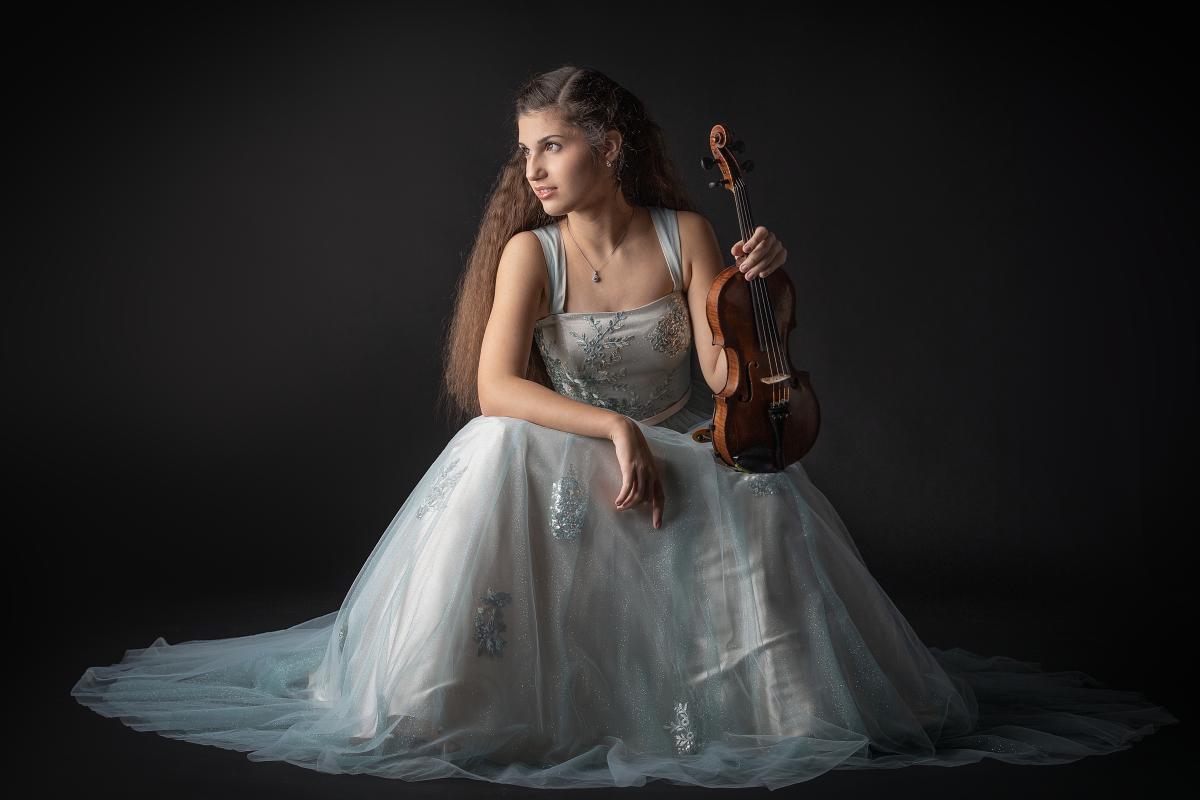The winner of the International Classical Music Award (ICMA) – DISCOVERY AWARD 2024, Lana Zorjan, captivates audiences globally with her extraordinary talent and performances. Lana first picked up the violin at the age of four, and her dedication and love for music have taken her to the most prestigious stages worldwide. The Novi Sad audience will have the chance to listen to Lana Zorjan with the Vojvodina Symphony Orchestra, conducted by Maximilian Haberstock, at the opening of the seventh Kaleidoscope of Culture on 5 September at 8:30 p.m. Her performance at the traditional classical music concert on Mihajlo Pupin Boulevard, known as ‘Korzo,’ will transform this busy boulevard into an open-air stage.
Ahead of the concert, we spoke with this talented violinist to uncover how working with prestigious artists and winning the ‘International Classical Music Award’ shaped her artistic expression and how she is preparing for a spectacular performance in the heart of Novi Sad.
You have been playing the violin since early childhood, so we are curious about what inspired you to pursue music and how your love for the violin has evolved over the years?
I come from a family of musicians, so the violin has always been present in my life. My mother is a violin professor, my father an opera singer, my maternal grandfather an ethnomusicologist, and on my father’s side, a former tuba player and accordionist in a military band. The violin was entirely my choice. My mother wanted me to play the piano, and my father didn’t have a strong desire for me to play any instrument. The violin simply always attracted me. I don’t know exactly what set it apart from other instruments for little three-year-old Lana to express a desire to play the violin. Maybe it was its noble yet diverse tone, looking up to my mother and her students, or something else, but from the moment I first took the violin in my hands and produced the first sounds (which were mostly squeaks at the time), I fell in love with playing. My love for the instrument grew more profoundly and on multiple levels as I matured as a person. Initially, of course, playing was just a game for me, but now I see violin playing as an extremely significant part of myself without which I simply wouldn’t be me. I would say that in the past year, I have matured emotionally, which naturally has taken my playing to a new level. Various situations in my personal life have significantly broadened my emotional range, which is evident in my playing. My love for this magical instrument will continue to grow, and so will I along with it.
As the youngest student at the Academy of Arts in Novi Sad, how do you see your role in inspiring young artists who may still be searching for their voice and place in the world of classical music?
As a developing young artist, it is an immense honor for me if I can inspire someone. The world of classical music is not easy, just like any other profession, but it is truly beautiful and special. It is based on great love for artistic creation, which has many branches. In one way or another, through any of them, you have the opportunity to help or make someone happy. Whether you are on stage as a soloist, chamber musician, orchestral musician, conductor, accompanis, or behind the scenes as a teacher, assistant, mentor… all these professions are essential for the survival of the classical music world, which I think is one of the aspects that makes it special. I still have a lot to learn, and I am eager for knowledge and improvement. That said, I will continue to put in continuous effort and work so that one day I may have the truly beautiful honor of being an inspiration to someone.
You have collaborated with numerous orchestras across Europe. How does the experience of performing as a soloist with different orchestras differ?
Every performance is a new challenge and, above all, a privilege. Playing with orchestras is truly magical because there is no longer just ‘I’ in the performance but ‘we.’ Dozens of people make music together, creating something beautiful. That being said, every experience of playing with an orchestra is unique and a new beautiful adventure. Of course, every concert is different, but there is something common to every concert with an orchestra, and that is teamwork. From every experience, I try to learn as much as possible so that I emerge from it as a better violinist and, more importantly, a better person. I have several solo concerts with different orchestras in the next few months, and I can say that I am genuinely looking forward to each of them, and I will do my best to meet everyone’s expectations, and most importantly, to create something beautiful with the orchestra that will hopefully brighten the listeners’ day.
How has working with Stefan Milenković influenced your artistic vision and style? Is there a particular moment from your work with him that you consider a turning point in your musical development?
Working with Professor Stefan Milenković is a dream come true for me. I have looked up to him since early childhood, and I am truly grateful for the privilege of learning from him. Our first lesson was in the spring of 2021, and since then, I have attended his Masterclass or Institute every summer. As of October 2023, I am officially his student, which means we have been working much more intensively. Over these three and a half years, I have learned a lot in every opportunity, and every moment can be seen as a kind of turning point, considering the progress after literally every lesson. Perhaps the most significant turning point was in October 2023 when I became his student at the Academy of Arts in Novi Sad.
After winning the prestigious ‘International Classical Music Award’ for 2024, how has this success shaped your artistic career? How do you cope with the new expectations and responsibilities that come with such recognition, and how does it motivate you for future projects?
Since January, when it was officially announced worldwide that I am the winner of the ICMA Award, my life has completely changed. Honestly, I still can’t believe I was even nominated for the award, let alone winning it, which I never expected in my wildest dreams. I have received offers for numerous significant concerts and collaborations, but the award hasn’t only changed my career but also me as a person. From the moment it was announced that I was the winner, my life has involved much more activity and obligations than before, and at first, it was truly exhausting. Of course, with this award comes a significant responsibility because now I step on stage as the ICMA Discovery Award winner for 2024. This drastically increases the audience’s expectations, but even more so, my own personal expectations. The award motivates me to give my best at all times, both on and off stage. I will strive to carry this award with gratitude through future, hopefully successful, adventures and to improve in as many aspects as possible every day.
What are the biggest challenges you have faced during your career, and how have you overcome them? Who or what inspires you the most in your artistic work?
Every artist’s career has its ups and downs. For me, the hardest part while growing up was probably finding friends who fully understood me, which, after talking to many young artists around the world, seems to be a common challenge for most young people in this field. My life simply revolves mostly around the violin. Since early childhood, absences from school because of the violin were simply confusing to my classmates, which I completely understand. A few years ago, I started making friends all over the world. Yes, unfortunately, most of our communication is through phone calls and messages, but I truly have wonderful friendships with young people (who live very similar lives to mine) and with whom I communicate daily. Since I enrolled at the Academy of Arts in Novi Sad, I have also made friends in the city/country. In time, that socialization problem completely resolved itself. In my artistic work, I am most inspired by a genuine love for the violin, music, and life in general. I believe that if I do what makes me happiest, which is playing and performing, and if others can be emotionally touched and enjoy the music I create, there is nothing better for me. As an artist, I believe my role on stage is very similar to that of a storyteller. I need to tell the story the composer presented in the piece I am playing, yet deliver it in my own way. When listeners feel emotions through my interpretation of a piece, that is the greatest success for me.
What are your long-term ambitions?
My dream is to perform in great halls around the world, gain new experiences, and bring joy to people with my artistic creations. I hope to establish myself as a soloist, but at some point, I would also like to teach. I want to be that person for young talents that my professors have been for me. The idea of passing on the knowledge that I hope to gain in the future from my professors and experiences on stage is very inspiring to me. I would also like to compose in my free time. In the past few months, I have started composing quite frequently, and I see it as a kind of therapeutic creation. When I have a tough day or when I’m stressed, composing suddenly brings my mind to a state of peace and calm.
As part of the opening of the seventh Kaleidoscope of Culture, you will hold an open-air concert on Novi Sad’s former main promenade. What are your expectations for this concert, and what are you preparing for the Novi Sad audience at Korzo?
This concert is, above all, an extremely significant moment in my career so far. I believe that if little Lana, a loyal fan of the Kaleidoscope of Culture, were to hear that I will soon be opening the programme, she would be in a great state of shock, but she would also be very proud. From this concert, I expect new beautiful memories, new knowledge through preparation and collaboration with Maestro Maximilian Haberstock and the Vojvodina Symphony Orchestra, and simply a dream concert that I never imagined I would have the privilege to achieve so soon. For the Novi Sad audience at Korzo, I have prepared Violin Concerto No. 1 in F-sharp minor by Henryk Wieniawski. This concerto is rarely seen on the world stage, let alone on our scene, so I am really looking forward to presenting it to an audience that may not be very familiar with it. It is one of the most technically demanding violin concertos, but it is truly divine and intensely romantic. Wieniawski wrote it at the age of just seventeen, which is truly shocking considering the amount of emotional maturity woven through extremely difficult technical passages that follow one another endlessly.
How do you see the importance of this event in promoting culture and the arts in Serbia?
For years, the Kaleidoscope of Culture has been promoting culture and the arts in Serbia. I believe this five-week programme is a fantastic opportunity for the audience to experience an exceptionally diverse, interesting, and supreme programmes. Now in its seventh year, it brings world stars to Novi Sad while simultaneously showcasing the greats of Serbian culture and providing opportunities for young artists, strengthening both the local and national scenes. I am truly immensely honored and sincerely grateful for the trust placed in me and for this incredible opportunity. I will do my utmost to prepare thoroughly so that the audience enjoys my, or rather our, performance to the fullest!
Partner of the Kaleidoscope of Culture is Erste Bank. #verujusebe
Author: Marina Marić
Photo: private archive



